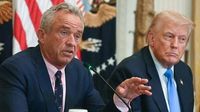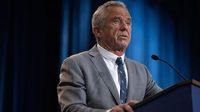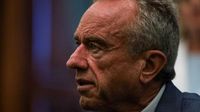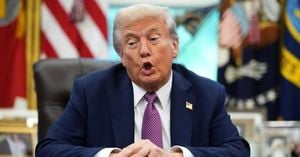More than 1,000 current and former employees of the Department of Health and Human Services (HHS) have taken the extraordinary step of publicly calling for the resignation of Secretary Robert F. Kennedy Jr., accusing him of endangering the nation’s health and causing chaos within the federal government’s public health infrastructure. The letter, signed on September 3, 2025, and sent to key Congressional committees and leadership, marks a dramatic escalation in what staff describe as a growing internal revolt against Kennedy’s leadership.
According to ABC News, the letter was organized by a group called Save HHS and was addressed not only to Kennedy himself but also to the Senate Committee on Health, Education, Labor and Pensions, the Senate Committee on Finance, the House Committee on Energy and Commerce, and the broader Congressional leadership. Employees from almost every agency within HHS—including the Centers for Disease Control and Prevention (CDC), the Food and Drug Administration (FDA), and the National Institutes of Health (NIH)—signed the letter. Notably, all signatories did so in their personal capacity, on their own time, and without using government resources.
The letter is unequivocal in its message: “We warn the President, Congress, and the Public that Secretary Kennedy’s actions are compromising the health of this nation, and we demand Secretary Kennedy’s resignation.” The signatories cite several specific actions as evidence, including the ousting of CDC director Susan Monarez late last month, which was quickly followed by the resignation of four senior CDC leaders. The letter also highlights Kennedy’s controversial decision in June to remove all 17 members of the CDC’s vaccine advisory panel—the Advisory Committee for Immunization Practices (ACIP)—and replace them with eight hand-picked members, many of whom are known for their vaccine-skeptic views.
Among those newly appointed to the ACIP are Dr. Robert Malone and Retsef Levi, both of whom have drawn criticism for their public statements regarding mRNA vaccines. Malone has discussed the unfounded theory that people were “hypnotized” into accepting mainstream ideas about COVID-19, while Levi has claimed there is “indisputable evidence” that mRNA vaccines cause “serious harm including death, especially among young people”—a claim not supported by scientific consensus or peer-reviewed research, as noted by ABC News.
The letter’s authors argue that these personnel changes have not only undermined the CDC’s scientific integrity but have also contributed to an environment of fear and instability within the agency. According to CNN, sources indicated that Dr. Monarez and Secretary Kennedy clashed over vaccine policies, leading to her forced departure just weeks after her Senate confirmation. The subsequent resignations of other top CDC officials have left the agency, in the words of one former director, “leaderless at a time when public trust in science is already fragile.”
Adding to the turmoil, Kennedy appointed Jim O’Neill, a Silicon Valley investor known for advocating unproven COVID treatments, as acting CDC director. This move has raised eyebrows across the public health community, with critics questioning O’Neill’s qualifications and commitment to evidence-based science.
The letter also links the current climate of politicized rhetoric surrounding vaccines to real-world violence, referencing the deadly shooting at the CDC’s Atlanta headquarters on August 8, 2025. The gunman, who killed a police officer in the attack, reportedly blamed the COVID vaccine for his health problems and left written documents expressing his grievances. The signatories of the letter argue that such incidents are not isolated, but rather the result of a broader erosion of trust and the spread of misinformation—issues they believe have been exacerbated by Kennedy’s leadership.
This is not the first time HHS staff have voiced concerns. A previous letter, signed by more than 750 employees last month, implored Kennedy to stop spreading inaccurate health information, affirm the CDC’s scientific integrity, and guarantee the safety of the HHS workforce. In response to the latest petition, the letter calls on President Trump and Congress to appoint a new health secretary “whose qualifications and experience ensure that health policy is informed by independent and unbiased peer-reviewed science” if Kennedy refuses to step down.
The outcry from within HHS has been echoed by prominent voices outside the agency as well. On September 1, nine former CDC directors published an op-ed in The New York Times warning that the firing of Monarez and the departure of other agency leaders “will make it far more difficult” for the CDC to fulfill its mission. “During our respective CDC tenures, we did not always agree with our leaders, but they never gave us reason to doubt that they would rely on data-driven insights for our protection, or that they would support public health workers,” they wrote.
For his part, Kennedy has defended his actions and vision for the agency. In an op-ed published in The Wall Street Journal on September 2, he argued that the CDC had “squandered public trust” during the COVID pandemic and that his efforts are about restoring that trust and returning the agency to its core mission. “Most CDC rank-and-file staff are honest public servants. Under this renewed mission, they can do their jobs as scientists without bowing to politics,” Kennedy wrote.
The official response from HHS has been measured but firm. Communications Director Andrew Nixon stated, “Secretary Kennedy has been clear: the CDC has been broken for a long time. Restoring it as the world’s most trusted guardian of public health will take sustained reform and more personnel changes.” Nixon added that Kennedy, “from his first day in office, pledged to check his assumptions at the door—and he asked every HHS colleague to do the same.” He further claimed that Kennedy and his team “have accomplished more than any health secretary in history in the fight to end the chronic disease epidemic and Make America Healthy Again.”
Despite these assurances, the chorus of concern appears to be growing louder. The letter’s authors conclude with a direct plea to other organizations and the broader public health community: “We ask other partner organizations to join us in our call for Secretary Kennedy’s resignation and stand in solidarity with those who have already.”
As the debate over the future of the CDC and HHS leadership intensifies, the stakes could hardly be higher. With public trust in science and government still recovering from the pandemic era, the outcome of this internal revolt may have far-reaching consequences for how the U.S. responds to future health crises—and for the credibility of the nation’s top health institutions.






